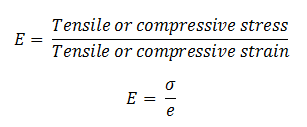In this article you will learn about the Elastic Constant - Young’s modulus, Modulus of rigidity and Bulk modulus. We will also discuss about the difference between Young’s modulus, Modulus of rigidity and Bulk modulus.

The various elastic constants in strength of materials are
- Young’s modulus or modulus of elasticity
- Modulus of rigidity or Shear Modulus
- Bulk Modulus

Let’s discuss about them one by one
Young’s Modulus
Definition: It is defined as the ratio of tensile stress or compressive stress to the corresponding strain within elastic limit. It is denoted by symbol E. It is also known as modulus of elasticity or elastic modulus.
Where
E = Young’s Modulus
σ = Tensile or compressive stress
e = Tensile or compressive strain
- The SI unit of Youngs modulus is N/mm2.
Modulus of Rigidity
Definition: It is defined as the ratio of shear stress to corresponding shear strain within elastic limit. It is also known as shear modulus. It is represented by C or G or N.
Where
τ = Shear stress
ɸ = Shear strain
- The SI unit of C is N/mm2
Bulk Modulus
Definition: It is defined as the ratio of direct stress to the corresponding volumetric strain within elastic limit. It is denoted by K.
σ = Direct stress
(dV/V) = Volumetric strain
- The SI unit of C is N/mm2
Difference Between Young’s Modulus, Modulus of Rigidity and Bulk Modulus.
S.no | Young’s Modulus | Modulus of Rigidity | Bulk Modulus |
1. | It is the ratio of tensile or compressive stress to the corresponding strain within elastic limit. | It is the ratio of shear stress to the corresponding shear strain within elastic limit. | It is the ratio of direct stress to the corresponding volumetric strain within elastic limit. |
2. | It is denoted by E. | It is denoted by C or G or N. | It is denoted by K. |
3. | E = stress/ strain | C = shear stress/shear strain | K = direct stress/ volumetric strain. |



No comments:
Post a Comment